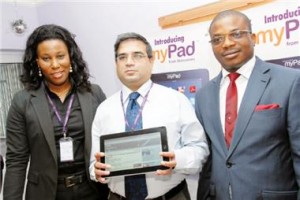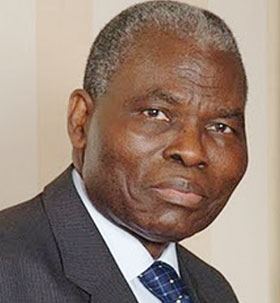Nigeria Mergers Give Starcomms New Chance Against Rivals
Nigerian telecommunications companies operating non-GSM technology, led by Starcomms Plc, have another chance to challenge dominant rivals, such as MTN Group Ltd. (MTN), after takeovers and new investments, the Association of Licensed Telecoms Operators of Nigeria said.
Starcomms Plc, a Nigerian telecommunications company, said on Oct. 31 it reached an agreement with Capcom Ltd. for investment of cash and assets worth $210 million in return for a 90.5 percent stake, handing over control of the company. Starcomms will get assets including a license operated by MTS First Communications Ltd. and the mobile-phone business of Multi-Links Telecommunications Ltd., giving it the biggest spectrum allocation for any mobile operator in Nigeria and making it the first able to run the faster 4G data services, according to the statement.
“There is a huge opportunity in providing broadband from greater funding and the combination of spectrum licenses of Starcomms and Multi-links,” Gbenga Adebayo, president of the association known as Alton, said in a Nov. 20 phone interview from Lagos, the commercial capital. “Broadband is required to be competitive in the telecommunications industry.”
Nigeria, Africa’s most populous nation with more than 160 million people, has one of Africa’s fastest-growing telecommunications industries, with about 107 million telephone subscribers as of September, according to industry regulator, the Nigeria Communications Commission. The Code Division Multiple Access, or CDMA, networks have about 4.8 million customers, or a 3.02 percent share of the country’s phone subscribers, with fixed lines at 0.44 percent and the global system of mobile communication, or GSM, at 96.54 percent.
Competitive Advantage
Capcom is a Lagos-based holding company, with investors including Nairobi, Kenya-based Oldonyo Laro Estate Ltd. and London-based Helios Investment Partners LLP, a private equity company backed by George Soros.
Capcom will buy Multi-Links from Helios and pay with Starcomms’ shares, which will make Helios a 10.5 percent shareholder of Starcomms, Funmi Abiola-Odutola, a communications consultant representing Capcom said in e-mailed comments on Nov. 21. Fergus Wheeler, a consultant for Helios declined to comment when contacted by e-mail, saying the discussions are confidential.
Starcomms was unchanged at 50 kobo a share as of 10:40 a.m. in Lagos. It has no imminent plans to pay a dividend and plans to invest profits to expand its business, according to astatement on the company’s website.
Networks Upgrade
“The combination of spectrum allocation of the companies making up Starcomms will count as a competitive advantage,” Akintola Salam, a telecommunications analyst at Lagos-based Financial Derivatives Co. said in an e-mailed response to questions.
Inadequate investments impaired CDMA growth while GSM networks run by Johannesburg-based MTN, Abu Dhabi-based Emirates Telecommunications Corp. (ETISALAT), known as Etisalat, Mumbai-based Bharti Airtel Ltd. (BHARTI) and Nigeria’s Globacom Ltd. prospered. MTN Nigeria, with more than 45 million customers, has a 42 percent share of the country’s phone subscribers, according to September data on the website of the regulator, also known as NCC. Globacom is second biggest with 19.8 million subscribers, while Airtel is third with 18 million.
“Starcomms and their new backers will be hoping that they leapfrog the GSM guys by investing heavily in LTE 4G,” Bunmi Asaolu, an analyst at Lagos-based FBN Capital Ltd., said in an e-mailed response to questions.
Visafone Communications Ltd., another CDMA operator in the West African nation, engaged Huawei Technologies Co. of China, earlier this year to upgrade networks at a cost of $20 million and plans to begin another phase of its expansion in January, Joseph Ushigiale a spokesman, said yesterday by phone from Lagos.
Visafone and Research In Motion Ltd. (RIM) started BlackBerry services on the CDMA mobile network on Oct. 28 “to achieve growth of data usage, thus becoming the first carrier to introduce the CDMA-enabled BlackBerry smart phones in Africa,” according to Ushigiale.
“If the purchase of Starcomms is successful, we hope to see more mergers and acquisitions by local and foreign investors,” said Adebayo of Alton. “There are many CDMA licenses that are redundant today because the companies stopped operations. They are targets.”









